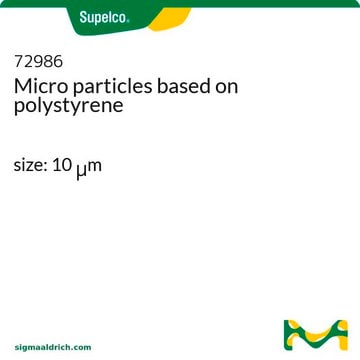The concentration is 1.8 x 10^11 particles per ml.
Méret kiválasztása
112 000,00 Ft
219 000,00 Ft
112 000,00 Ft
Erről a tételről
Ugrás ide:
Forma
aqueous suspension
keresztkötés
0 % cross-linked
összetétel
polystyrene
koncentráció
10% (solids)
részecskeméret
1 μm std dev <0.1 μm, coeff var <5%
sűrűség
1.05 g/cm3
tárolási hőmérséklet
2-8°C
Hasonló termékeket keres? Látogasson el ide Útmutató a termékösszehasonlításhoz
1 of 4
Ez a tétel | 43302 | 59769 | 72986 |
|---|---|---|---|
| particle size 1 μm std dev <0.1 μm, coeff var <5% | particle size 100 nm std dev ≤0.01 μm | particle size 500 nm | particle size 10 μm std dev <0.2 μm, coeff var <2% |
| form aqueous suspension | form aqueous suspension | form aqueous suspension | form aqueous suspension |
| crosslinking 0 % cross-linked | crosslinking - | crosslinking - | crosslinking 2 % cross-linked |
| concentration 10% (solids) | concentration 10% (solids) | concentration 10% (solids) | concentration 10% (solids) |
| density 1.05 g/cm3 | density 1.05 g/cm3 | density 1.05 g/cm3 | density 1.05 g/cm3 |
| storage temp. 2-8°C | storage temp. 2-8°C | storage temp. 2-8°C | storage temp. 2-8°C |
Általános leírás
Alkalmazás
- Electron Microscopy.
- Cell Counter Calibration.
- Immunodiagnostics, especially for latex agglutination tests, and
- Phagocytosis Research.
Analízis megjegyzés
Egyéb megjegyzések
kapcsolódó termék
Tárolási osztály kódja
11 - Combustible Solids
WGK
WGK 3
Lobbanási pont (F)
Not applicable
Lobbanási pont (C)
Not applicable
Egyéni védőeszköz
Eyeshields, Gloves, type N95 (US)
Válasszon a legfrissebb verziók közül:
Már rendelkezik ezzel a termékkel?
Az Ön által nemrégiben megvásárolt termékekre vonatkozó dokumentumokat a Dokumentumtárban találja.
-
What is the concentration of microplastics in the suspension?
1 answer-
Helpful?
-
-
Are the Microparticles based on polystyrene in a suspension sterile? Or is it possible to sterilize the microparticles?
1 answer-
The polystyrene microparticles offered for sale are not sterile.
Although autoclaving is a common method of sterilization, polystyrene microparticles are not autoclavable. Filter sterilization is also not a practical method. There are no protocols available for sterilizing polystyrene microparticles. From the remaining methods for sterilization, it should be possible to either sterilize in 70% ethanol for 30 minutes and then rinse away the ethanol with sterile water. For small batches, UV radiation would be another option.
Helpful?
-
-
What is the composition of the "Aqueous Suspension." I want to use these in an exposure experiment, but must control for whatever the suspension is. Is it possible to get the exact details of its makup.
1 answer-
The composition is water and polystyrene.
Helpful?
-
Active Filters
Tudóscsoportunk valamennyi kutatási területen rendelkezik tapasztalattal, beleértve az élettudományt, az anyagtudományt, a kémiai szintézist, a kromatográfiát, az analitikát és még sok más területet.
Lépjen kapcsolatba a szaktanácsadással
